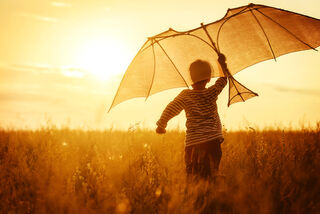Environment
Kids Really Do Have Great Ideas
How a mother and son got through the pandemic.
Posted June 2, 2022 Reviewed by Gary Drevitch
It started over the dinner table. Seven-year-old Everest van der Zwan asked his parents questions about what they were like at his age. What was your favorite subject in school? Did you ever get stitches? Why? Who were your friends? He wanted to know who his parents were; he had asked them more than a hundred questions. This is where the idea of a card game was spawned. While his mother Ariane handled things like budget and hiring a web designer, Everest was hands-on with many aspects of the process. Most important was the time spent learning about each other. Here are some of their thoughts on working together.
What inspired you to invent a card game?
Everest: One evening at dinner during the pandemic, I asked my mom: What books did you read as a kid? I was reading Harry Potter at that time. Did you have pocket money? I was trying to negotiate getting more myself. These questions became the idea for a card game. I wanted to start something that everyone could use, and maybe help families have more fun and get to know each other better.
How can parents encourage a child’s entrepreneurial spirit?
Ariane: Kids get their first entrepreneurial cues from their parents. Discussing new ideas, products, and ways to improve life around them creates an environment of creative thinking. Celebrating other entrepreneurs, and talking about startups and cool products can help kids become familiar with entrepreneurship. Also, encouraging kids when they do have ideas, asking them to share the ideas, and answering their questions, sends the message that their creativity matters. Grown-ups aren’t the only ones with ideas. Finally, starting something together as a family is a great foundation.

Do you have other ideas? What are your overall goals?
Everest: The idea I really want to take on is how to clean the ocean. I just visited Kenya and the beautiful beaches were full of garbage. I want to be part of the solution. We got a giant bucket to pick the litter up; the bucket was overflowing. I also had an idea about making meditation a fun game for kids. My overall goals are to make more money so we can do good things–like clean up the ocean, help more kids go to school, or save the few rhinos that remain.
How can parents support their kids’ ideas without taking over the decision-making process?
Ariane: Parents play a key role in showing kids what is required to grow an idea. The important thing in shared decision-making is to guide the child on what is important to think about. If there is a decision to make, don’t just give them the answer. Ask your child questions and let them think about it.
How do you think this process will shape you as a grown-up?
Everest: It will help me with future projects. Now that I have the basics of how it's done, it doesn’t seem so scary. I can try something and see how it works and then change it later. It's not permanent. We started with giant cards, a different design with a different card material, and changed it. It has taught me how to ask for help and that you have to really be patient. You have to wait for everything: The prototypes, the design, the awards, the sales.
What have you learned about yourself as a parent through this project?
Ariane: When I grew up, we took the safe route, the idea of the safe job dominated our household. But I learned that I could open up the entrepreneurial door for my son early on. I learned that even at age 7, he wasn’t too young to be involved in doing real work and that I should never underestimate his ability to stay focused. It was important to show him that it is absolutely possible to have an idea and six months later, see it as a real product. That in itself breaks down barriers where a kid can live within an open field of possibility.
What do you want other kids and parents to know?
Everest: Kids, your ideas are spectacular and doable. You just need to try. Make a plan and pick the adult who you trust and know well. Parents, always believe in your kids and support them. Kids see the world in a different way; it’s a place to have fun, play, and be happy. It’s not just about work. It's fun doing it with someone else and not alone. Tell everyone you know, otherwise your product will crash and it will just be a good idea that no one heard about.
What has been most surprising in this adventure?
Ariane: The biggest joy came from the moments we were working on this together. It surprised me how capable children are. Like many children, my son is very concerned about the planet; climate change, poverty, racism, and homelessness. While most adults are focused on what an idea or business can do for themselves, kids focus on what it can do for others. That was a big revelation.
References
Kids Ask the Coolest Questions


